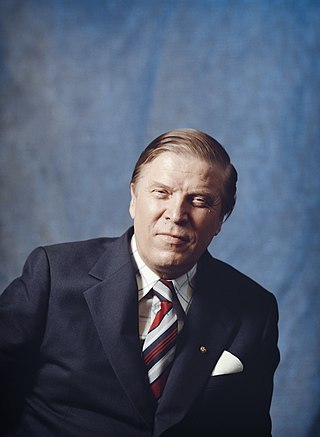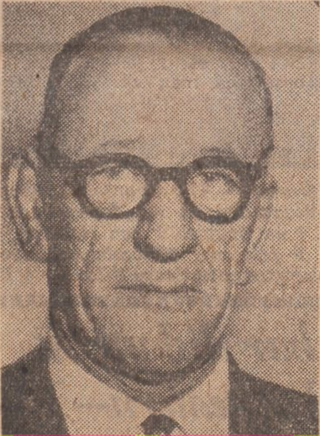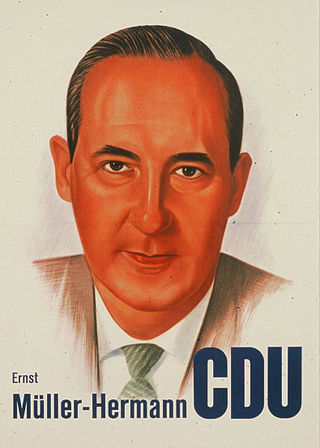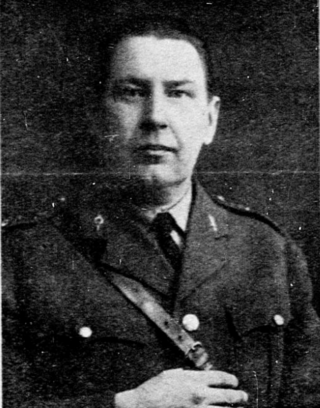Related Research Articles

Johannes Rau was a German politician (SPD). He was the president of Germany from 1 July 1999 until 30 June 2004 and the minister president of North Rhine-Westphalia from 20 September 1978 to 9 June 1998. In the latter role, he also served as president of the Bundesrat in 1982/83 and in 1994/95.

Väinö Alfred Tanner was a leading figure in the Social Democratic Party of Finland, and a pioneer and leader of the cooperative movement in Finland. He was Prime Minister of Finland in 1926–1927.

Johannes Virolainen was a Finnish politician and who served as 30th Prime Minister of Finland, helped inhabitants of Karelia, opposed the use of alcohol and created Mandatory Swedish in Finnish basic schools.

Finnish People's Democratic League was a Finnish political organisation with the aim of uniting those left of the Finnish Social Democratic Party. It was founded in 1944 as the anti-communist laws in Finland were repealed due to the demands of the Soviet Union, and lasted until 1990, when it merged into the newly formed Left Alliance. At its time, SKDL was one of the largest leftist parties in capitalist Europe, with its main member party, the Communist Party of Finland, being one of the largest communist parties west of the Iron Curtain. The SKDL enjoyed its greatest electoral success in the 1958 parliamentary election, when it gained a support of approximately 23 per cent and a representation of 50 MPs of 200 total, making it the largest party in the Eduskunta.

Ahti Kalle Samuli Karjalainen was a Finnish economist and politician. He was a member of the Agrarian League and served two terms as Prime Minister of Finland. He is, however, better known for his period as Minister of Foreign Affairs of Finland. Karjalainen is considered one of the most influential figures in post-war Finnish politics. Like President Urho Kekkonen, Karjalainen attached great importance to Finland's relationship with the Soviet Union, and was at one point considered to be Kekkonen's likely successor until alcoholism affected his later career.
Parliamentary elections were held in Finland on 6 and 7 July 1958. The communist Finnish People's Democratic League emerged as the largest party, but was unable to form a government.
Social Democratic Union of Workers and Smallholders was a political party in Finland. TPSL originated as a fraction of the Social Democratic Party of Finland, headed by Emil Skog and Aarre Simonen. Skog was the former chairman of SDP and was in dispute with the incumbent chairman, Väinö Leskinen. The party was founded in 1959, had seats in the parliament in 1959–1970 and was dissolved in 1973. It was generally identified as being politically between SDP and SKDL.
Johannes Agnoli was a German political scientist of Italian descent. He analysed the modern democratic state in a post-marxist and structuralist way, trying to show how modern parliamentarism transforms capital interests into illusionary democratic decisions. The mechanisms of party rule and parliamentary procedures lead to an exclusion of social conflicts from political processes and to pacification of the inherent antagonism within society by manipulation.

Karl-August Fagerholm's third cabinet, also known as the Night Frost Cabinet or the Night Frost Government, was the 44th government of Republic of Finland, in office from August 29, 1958 to January 13, 1959. It was a majority government. The cabinet was formed after the parliamentary election of 1958.

Valdemar (Vladimir) Liljeström was a Finnish trade union activist and politician. He was at first a member of the Social Democratic Party of Finland and, after 1959, of the Social Democratic Union of Workers and Smallholders. He served as the chairman of the Metalworkers' Union from 1947 until 1960, as Minister of Social Affairs in Karl-August Fagerholm's first cabinet, Deputy Minister of Public Works in Vieno Johannes Sukselainen's first cabinet, Minister of Social Affairs in Reino Kuuskoski's cabinet and as a Member of Parliament.

The Social Democratic Party of Finland is a social democratic and pro-European political party in Finland. It is the third largest party in the Parliament of Finland with 43 seats. Founded in 1899 as the Workers' Party of Finland, the SDP is Finland's oldest active political party and has a close relationship with the Central Organisation of Finnish Trade Unions. It is also a member of the Party of European Socialists, Progressive Alliance, Socialist International and SAMAK.

Aarre Edvard Simonen was a Finnish lawyer and politician.

The Night Frost Crisis or the Night Frost was a political crisis that occurred in Soviet–Finnish relations in the autumn of 1958. It arose from Soviet dissatisfaction with Finnish domestic policy and in particular with the composition of the third government to be formed under Prime Minister Karl-August Fagerholm. As a result of the crisis, the Soviet Union withdrew its ambassador from Helsinki and put pressure on the Finnish government to resign. The crisis was given its name by Nikita Khrushchev, who declared that relations between the countries had become subject to a "night frost".

Alwin Brück was a German politician who was a member of the Social Democratic Party of Germany (SPD). He was Parliamentary Secretary of the Federal Ministry of Economic Cooperation and Development from 1974 to 1982.

Ernst Müller-Hermann was a German politician of the Christian Democratic Union (CDU) and former member of the German Bundestag.

Yrjö Oskar Ruutu was a Finnish social scientist and politician. Ruutu was the first principal of the School of Social Sciences 1925–1932, 1935–1945 and 1949–1953, and the first Finnish professor of International relations 1949–1954. Ruutu was the first in Finland to defend his doctoral thesis on social sciences and wrote the first Finnish presentation on international relations as a science. He was also the head of the National Board of Education 1945–1950.
The National Socialist Union of Finland, later the Finnish-Socialist Party was a Finnish Nazi political party active in the 1930s, whose driving force and ideologue was Professor Yrjö Ruutu. With an ideology based on Ruutu's theories, the party came to reject orthodox German Nazism.

Ensio Ilmari Uoti was a Finnish politician and Nazi who in the 1930s was the leader of the Finnish-Socialist Workers' Party (SSTP).
Johannes (Hannes) Tiainen was a Finnish agronomist, civil servant and politician, born in Sortavala. He was a member of the Social Democratic Party of Finland (SDP) After the SDP split in 1959, Tiainen joined the Social Democratic Union of Workers and Smallholders (TPSL). He served as Deputy Minister of Agriculture from 3 December 1952 to 9 July 1953 and from 5 May to 20 October 1954, as Deputy Minister of Transport and Public Works from 20 October 1954 to 27 May 1957 and as Deputy Minister of Social Affairs from 22 October 1954 to 27 May 1957.
Uoti is a surname. Notable people with the surname include: